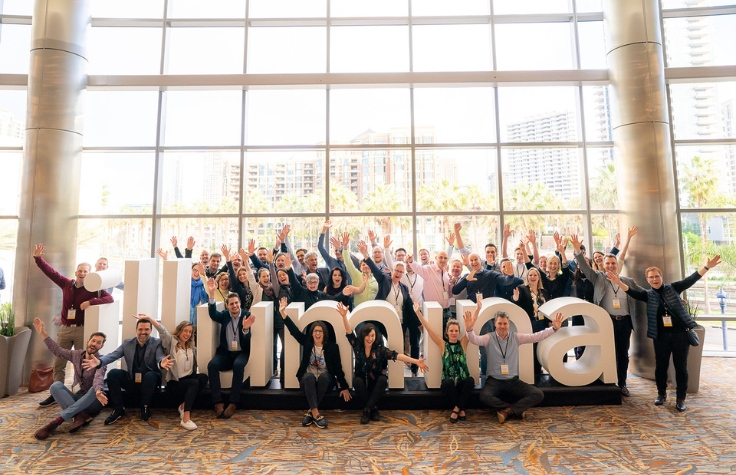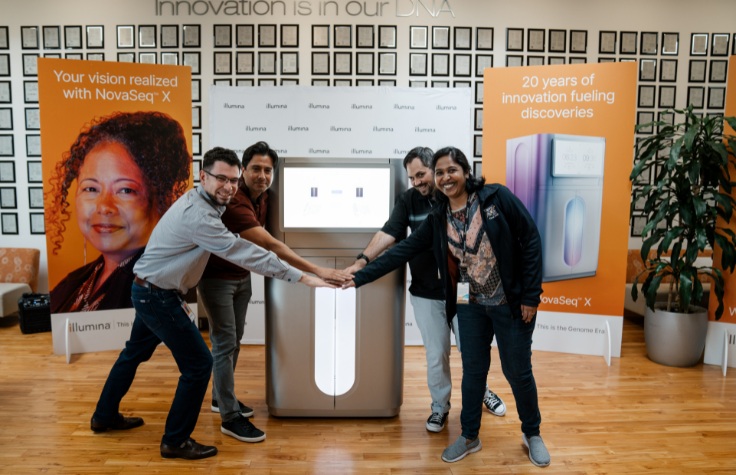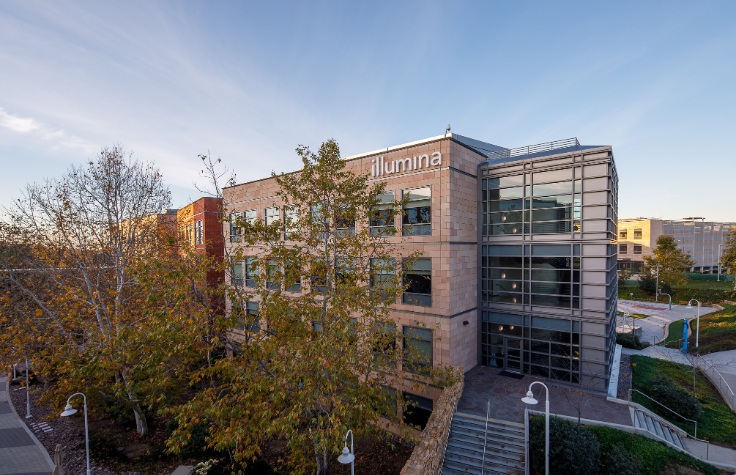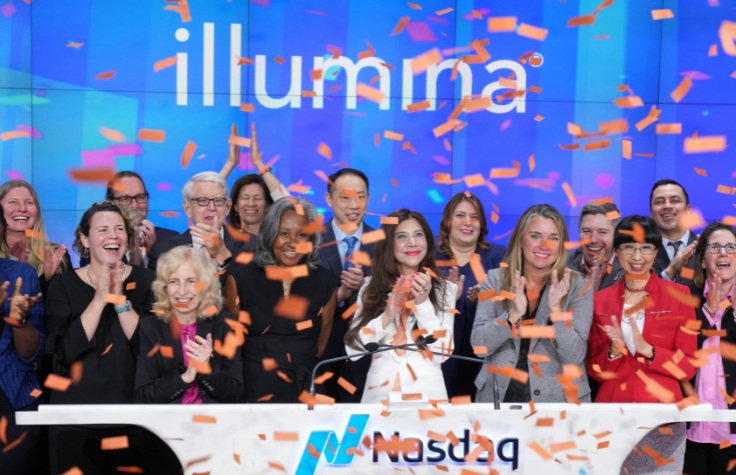
April 3, 2023
This month, Illumina celebrates a quarter century of innovation, research, and passion. As a genomics pioneer founded in San Diego in 1998, we have proven—and continue to prove—how unlocking the power of the genome can exponentially improve the human condition.
When the company began 25 years ago, it was revolutionary just to decode the genome. Since then, genomics has played a crucial role generating insights into infectious disease, cancer, reproductive health, genetic disease, and more—while improving patient outcomes every step of the way. To date, scientists and researchers have generated more than one billion gigabases of data and sequenced nearly four million people, and potential uses for that data multiply every year. Around the world, our customers and partners are sequencing samples extracted from seaweed, sugarcane, soil, yams, river water, wastewater, gorillas, ancient Nordic bones—the list goes on. It’s not surprising that over 300,000 studies featured in peer-reviewed scientific publications have used Illumina technology. Today, our workforce is 10,000 strong, with more than 8800 patents in 34 locations worldwide. We’re celebrating 25 years of growth by looking at 25 of the greatest impacts that Illumina technology has made to date.
1. We advanced sequencing chemistry to be faster, more accurate, and more stable. When we launched the Genome Analyzer in 2007, we introduced the world to Illumina sequencing by synthesis (SBS) chemistry. SBS forever changed how sequencing is done, as it delivers high accuracy and a high yield of error-free reads. In the years leading up to 2022, we created XLEAP-SBS chemistry, which is engineered for longer reads with up to 2× faster incorporation speed and 3× greater accuracy. And because we made this chemistry stable at ambient temperatures, it no longer needs to be packed with dry ice, making it more sustainable as well as accessible to markets that lack the infrastructure for dry ice shipping.
2. We made DNA sequencing more affordable and accessible. In the last 14 years, we helped take the cost of sequencing a human genome from $150,000 to $200, a drop of more than 99%. Getting to the $10,000 genome in 2010 was a major feat, thanks to the Illumina HiSeq 2000. HiSeq made whole-genome sequencing (WGS) possible for labs of all sizes and drove widespread adoption of exome sequencing and noninvasive prenatal testing (NIPT). In 2022, we launched our most powerful and most sustainable sequencers to date, the NovaSeq X Series. The NovaSeq X Plus can sequence more than 20,000 whole genomes per year and enables the $200 genome.

3. We're increasing the diversity of available genomic data to better reflect our world. In 2008, Illumina completed the first-ever sequencing of an African human genome, from an anonymous Yoruban man from Nigeria. From the very beginning we have prioritized diversity, and in the years since, our partnerships with Our Future Health in England, PRECISE in Singapore, All of Us in the US, and OurDNA in Australia have allowed researchers to better target mutations specific to certain populations and deliver on the promise of precision medicine for all. Most recently, we announced an agreement between Illumina, Nashville Biosciences, and Amgen to sequence 35,000 DNA samples from African American patients at Vanderbilt University Medical Center. This is the first announcement from the Alliance for Genomic Discovery, created by Illumina and Nashville Biosciences, to perform WGS on 250,000 de-identified patient samples and make them available to pharmaceutical companies looking to develop new, life-changing therapies.
4. WGS for newborns in intensive care is on its way to becoming a universal standard of care. In the last several years, a handful of institutions have made life-changing advances in diagnosing critically ill babies with lifesaving speed. In 2015, Dr. Stephen Kingsmore, then at Children’s Mercy Hospital in Kansas City and using a HiSeq 2500, set a Guinness World Record for fastest genetic diagnosis, in 26 hours (now at Rady Children’s, he has implemented rapid WGS as a frontline diagnostic). Beginning in 2017, a groundbreaking study went on to demonstrate the value of WGS across five US hospitals. Other programs and studies at institutions from Germany to the United Arab Emirates have begun implementing WGS in their neonatal intensive care units. And in October 2022, NHS England launched the world’s first national genetic testing service, promising to sequence severely ill newborns for diagnosis within days. (Read Baby Fitz’s story here.)
5. Patients with rare genetic diseases are getting answers—faster. In high-income countries, genetic disease patients often remain undiagnosed for up to seven years or more, while in low- and middle-income regions, many families never learn the cause of their child’s suffering. This “diagnostic odyssey” costs families time and money, and causes frustration and heartache. But WGS is one way to arrive at a diagnosis within weeks. For 10 years, the Illumina iHope program has facilitated pro bono genome testing for more than 1700 children with suspected rare genetic disease across 24 clinical sites in eight countries. Approximately 40% of them have received a diagnosis and up to 78% received a change in their care management as a result. Based on the success of this program, Illumina recently announced an expansion of iHope to China. Illumina has committed to dramatically expanding access to genome testing outside China through a partnership with Genetic Alliance to develop iHope Genetic Health—a program supported by a $120 million in-kind donation of sequencers, reagents, and software to enable dozens of laboratories to provide genome testing in low- and middle-income communities around the world. This effort will reach up to 50,000 patients a year in five years.
6. NIPT and carrier screening transformed reproductive health for expecting families around the world. The VeriSeq NIPT Solution, released in 2017, provides fetal chromosomal information through a simple maternal blood test, significantly expanding families’ ability to make informed health care decisions. In 2020, the American College of Obstetricians and Gynecologists amended its guidelines, recommending that all pregnant people, regardless of age or baseline risk, receive testing. Prospective parents can test before conception, and embryos produced through in vitro fertilization can be tested. Further, products such as the Illumina Global Diversity Array with Carrier Screening Content v2 (intended for research use only), can screen for as many as 600 different autosomal recessive disorders.
7. Our arrays ushered in a new era of large-scale genomics. They changed the research and applied market landscape in applications such as genetic disease testing, agrigenomics, population genomics, and epigenetic research. We began developing array technology in 1998 and launched our first product in 2001. Today it is a $400 million business and a core part of how we address cost-sensitive applications and geographies. Innovations such as the Infinium Global Diversity Array with Enhanced PGx and the upcoming EX workflow will enable service providers to process samples in a quicker, more cost-effective manner that ultimately benefits patients, while the expansion of our methylation array portfolio will enable new insights in population cohorts and has the potential to improve outcomes in oncology and genetic disease testing.
8. We helped accelerate the field of precision oncology with comprehensive genomic profiling. In 2018, we introduced a pan-cancer assay designed to identify known and emerging tumor biomarkers. TruSight Oncology 500 (TSO 500) uses both DNA and RNA from subject tumor samples to identify key somatic variants underlying tumor progression, such as small DNA variants, fusions, and splice variants. It can measure tumor mutational burden and microsatellite instability, features that are potentially important biomarkers for immunotherapies. In 2022, we debuted the TruSight Oncology Comprehensive (TSO Comp) in vitro diagnostic kit to help inform treatment for cancer patients in Europe. We also launched the first companion diagnostic for TSO Comp, enabling targeted therapy with Bayer’s Vitrakvi medicine for patients with NTRK fusion cancer. With Merck, we codeveloped a TSO 500 HRD research assay.
9. Liquid biopsy became possible. The ability to detect cell-free circulating tumor DNA from tumors is growing. Clinical researchers see it as a potential alternative to invasive tissue biopsies, and the breakthrough technology can also help with multi-cancer early detection (MCED). With the help of MCED, catching cancer before it spreads increases the overall cancer survival rate by 400%.
10. We enabled partners to develop the COVID-19 vaccine without a live virus.In a lab at the Shanghai Public Health Clinical Center (SPHCC), researchers used a MiniSeq to sequence the sample of a seafood market worker admitted to the Central Hospital of Wuhan on December 26, 2019. SPHCC was one of the first to publish the viral genomic sequence, and it was this sequence that made vaccine development possible in just 10 months, rather than decades. It was also a catalyst for mRNA technology advancements in oncology testing, HIV, malaria, Ebola, and more.
11. We responded quickly to the need for widespread sequencing of SARS-CoV-2. On June 9, 2020, we received the first FDA Emergency Use Authorization for a sequencing-based COVID-19 diagnostic test. The Illumina COVIDSeq Test helped pave the way for large-scale, next-generation sequencing (NGS) COVID-19 testing, just a few months into the pandemic. By summer 2021, most of the resulting test data—which was being used to identify viral variants, which could help public health agencies manage the pandemic—was coming from large genomic centers. Countries with limited resources to invest in high-throughput sequencers had far fewer submissions to COVID surveillance networks. Illumina launched the COVIDSeq Assay, which allowed small labs to participate in surveillance. Rural regions like the Yucatán peninsula in Mexico, with its influx of tourists and immigrants, were finally able todetect the variants present in the local community.
12. We doubled the number of countries in which we could enable access to genomics. Over the course of the pandemic, it became clear that sending samples across regions and borders to testing labs was not fast or scalable enough to mitigate the spread of new variants. Our customers, particularly global nongovernmental organizations such as the World Health Organization, United Nations Development Programme, and Association of Public Health Laboratories as well as the Illumina Foundation were requesting to have our products available in nearly every corner of the inhabited world. In just over six months beginning in late 2021, a cross-functional, global team at Illumina set up our systems to enable commercial orders and shipments to 88 additional countries and territories across Africa, Asia, Latin America, and Eastern Europe. The feat provided on-the-ground access to genomics to 900 million more people.
13. The world got a crash course in genomics. As the coronavirus pandemic unfolded, terms like “PCR” and “mRNA” entered the mainstream lexicon. Public health officials became recognizable figures, and Illumina was at the ready to share our knowledge about the power of genomics to impact human health with government leaders, health care professionals, and society writ large. In February 2021, our CEO, Francis deSouza, penned an essay for The Economist, calling for a global “Bio Force” to track viruses; two months later, deSouza appeared on the cover of TIME magazine when Illumina was named one of the 100 Most Influential Companies.
14. Pathogen surveillance expanded around the globe. In April 2021, we committed $60 million in sequencing capabilities to a global pathogen genomics initiative, in partnership with public and private entities. It expanded on the Africa Pathogen Genomics Initiative (Africa PGI) announced the previous October, to build critical public health capabilities in areas of need and bring us closer to the vision of an early warning system for disease outbreaks. (In a matter of months, the number of sequencing labs in Africa grew from seven to 40.)

15. We’re working to make adverse drug reactions a thing of the past. We’re developing pharmacogenomics testing to prevent adverse drug reactions, the most common cause of hospital admissions worldwide and one of the leading causes of death. (Watch Mehri’s story here.)
16. Millions of pet owners were able to improve their animal’s health. Our customers brought to market DNA tests to detect canine cancer earlier, and identify a cat’s breed, traits, and health risks.
17. We are supporting researchers enabling a more sustainable, nutritious food supply.Every year since 2011, we have awarded one Illumina Agricultural Greater Good Initiative grant. The program spurs critically needed research that will increase the sustainability, productivity, and nutritional density of agriculturally important crop and livestock species. Grant recipients receive donations of Illumina products. Our most recent winners are studying yams in Nigeria, mung beans in multiple regions, honeybees in Germany, and, as announced this year, marine algae in Brazil.
18. Genomics began supporting wildlife conservation. Initiatives like our iConserve program have brought the global community together to accelerate environmental and wildlife conservation. Some of iConserve’s work consists of facilitating research in comparative genomics of various species, which provides structure to cataloging biodiversity in wild and captive populations. This ultimately supports decisions made regarding species conservation and management. In recent years, we have been able to support research into the genomes of the bottlenose dolphin, red ruffed lemur, western lowland gorilla, and African elephants.
19. We convened world and industry leaders to discuss and advance the power and promise of genomics. At the inaugural Illumina Genomics Forum in September 2022, former President Barack Obama, Bill Gates, Nobel laureate Frances Arnold, and other experts shared their insights on genomics and health care.
20. We advocated for reimbursement (and we still do). Since its inception in 2017, our market access team has been working with consortiums, governments, payers, and others to increase insurance coverage for genetic testing. In 2021, the world crossed a significant milestone, with over one billion people across 45 countries reimbursed for genomic tests, cancer therapy selection, genetic disease diagnosis, and noninvasive prenatal testing. The market access team continues to advocate for patient access through innovative collaborations and contracts.
21. Our customers and partners used NGS to help protect the environment. Canada’s STREAM project sequences river water and sediment samples to advance watershed health monitoring, Checkerspot is using microalgae to create a sustainable alternative to petroleum, and LanzaTech is turning carbon emissions into valuable material commodities—its facilities in China have produced over 50 million gallons of ethanol from industrial emissions, which is the equivalent of keeping over 200,000 tons of carbon from entering the atmosphere.
22. The volume of genomic data has exploded—and so have the insights. Ever since we acquired Solexa in 2007, NGS data output has increased at a rate that outpaces Moore’s law—more than doubling each year and creating immeasurable opportunities. Today, the amount of total genetic data generated around the world exceeds one billion gigabases. We’ve made significant improvements to our platforms and product pipeline to provide highly accurate, comprehensive, efficient analysis of this data. We launched Illumina Connected Analytics to empower customers to manage, analyze, and explore large volumes of multi-omic data in a scalable and flexible environment guided by core principles of security and privacy. Illumina DRAGEN Original Read Archive technology performs data compression in the cloud, reducing customers’ carbon footprint by up to five times.
23. We made big science green science. Last year, Illumina ranked highest in our industry in the Dow Jones Sustainability Index. In July 2022, we were the first genomics company whose plan to meet net-zero targets was approved by the Science Based Targets initiative, which includes validation of our corporate greenhouse gas emissions reduction targets. In 2021, the company met 59% of its energy needs through renewable sources, and by 2030 it aims to use 100% renewable energy and 75% less packaging. By 2050, it aims to become a net-zero company.
24. The next generation of scientists stepped into the lab. We celebrate DNA Day each April, and our 2022 campaign reached more than 90,000 STEM learners, inspiring the next generation of scientists and discoverers. Illumina has reached over 1 million STEM learners since 2019, and we aim to reach 5 million by 2030.
25. We championed a diverse and global workforce. In 2022 alone we received more than a dozen awards and recognitions from companies like Forbes, Newsweek, Bloomberg, and Dow Jones. We also empower our employees—in commemoration of the 25th anniversary, we are providing twenty-five $25,000 grants in communities where we operate, and we have provided $25 to each employee to donate to a cause of their choice.
And in the next 25 years—or even 25 weeks—starting with the debut of Illumina Complete Long Read sequencing technology, stay tuned for more breakthroughs in cardiovascular disease testing, drug target discovery using AI-based genome interpretation and analysis, and expanded testing capabilities for countries most impacted by tuberculosis. In the meantime, our customers are making strides in research for autism spectrum disorder, PTSD, diabetes, and more.
For a quarter-century, Illumina has been on the forefront of a global genomics movement. We celebrate this milestone with excitement and can’t wait to see how many more patients are able to experience better outcomes through the power of genomics. Here’s to another 25 years of making even greater impacts in the Genome Era.



